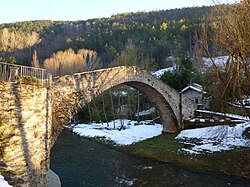Portico e San Benedetto (Romagnol: Pôrtic e San Bandét) is a comune (municipality) in the province of Forlì-Cesena, in the Italian region of Emilia-Romagna, located about 60 kilometres (37 mi) southeast of Bologna.
Portico e San Benedetto | |
|---|---|
| Comune di Portico e San Benedetto | |
 Ponte della Maestà at Portico di Romagna | |
| Coordinates: 44°2′N 11°47′E / 44.033°N 11.783°E | |
| Country | Italy |
| Region | Emilia-Romagna |
| Province | Forlì-Cesena (FC) |
| Frazioni | Bocconi, Portico di Romagna, San Benedetto in Alpe |
| Government | |
| • Mayor | Maurizio Monti |
| Area | |
| • Total | 60.8 km2 (23.5 sq mi) |
| Elevation | 456 m (1,496 ft) |
| Population (Dec. 2019)Dato Istat - Resident population. | |
| • Total | 734 |
| • Density | 12/km2 (31/sq mi) |
| Time zone | UTC+1 (CET) |
| • Summer (DST) | UTC+2 (CEST) |
| Postal code | 47010 |
| Dialing code | 0543 |
| Website | Official website |
It is formed by three main distinct settlements:
- Portico di Romagna, 36 kilometres (22 mi) from Forlì
- San Benedetto in Alpe, 48 kilometres (30 mi) from Forlì
- Bocconi, midway the two former localities
Main sights
editIn Bocconi:
- Ponte della Brusia, an 18th-century three arch bridge[2]
In Portico di Romagna:
- Palazzo Portinari, which, according to tradition, belonged to Folco Portinari's large, extensive family, father of the Beatrice Portinari described by Dante Alighieri
- Palazzo Traversari. The theologian Ambrogio Traversari was born here.
- Ponte della Maestà ("Majesty Bridge", 17th–18th centuries)
In San Benedetto in Alpe:
- Acquacheta water fall on the river of the same name, also described by Dante Alighieri in his Divine Comedy (Inferno, Canto XVI, 100–101)
- Monastery of St. Benedict, of medieval origins
References
edit- ^ "Superficie di Comuni Province e Regioni italiane al 9 ottobre 2011". Italian National Institute of Statistics. Retrieved 16 March 2019.
- ^ RomangaToscana Tourismo
External links
edit



